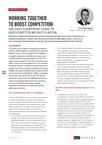
Joint Audit is the only proven solution to increase market competition
We are all familiar with the recent scandals, such as the collapse of Carillion in 2018, which have once again fed the debates around audit reform. But also, in the last couple of months, a series of UK authorities have all converged towards a consensus: audit reform in the country is essential and long over-due. The last report to date, published by the British Competition and Market Supervisory Authority (CMA) on 18 April 2019, has severely highlighted the flaws that exist in the current audit market. The report calls for greater competition and has concluded that joint audits are the only proven solution to tackle market concentration. Just to give you an idea of the extent of the concentration in the UK, 100% of companies listed in the FTSE 100 and 97% in the FTSE 350 are catered for by the Big Four firms.
This report has been widely read by other regulators around the world, so joint audit is back on the agenda globally.
Nonetheless, why does this mean joint audit is the adequate solution?
- Firstly, the facts speak for themselves: France introduced mandatory joint audits more than 50 years ago and, as a result, the French audit market is more diverse than any other national economy in the EU. Therefore, joint audit is the only proven solution to increase market competition and should be seriously considered for audit reform within and outside the EU.
- Secondly, joint audits improve quality. Why? Because having two auditors strengthens the control mechanisms in place and seriously reduces the probability of error. Having two sets of expertise can only benefit the quality of the audit. Moreover, the three-way relationship between the company and the two auditors ensures higher degrees of independence and objectivity.
- Finally, joint audits reduce the risk of knowledge loss when changing auditor during a mandatory rotation. If one of the appointed auditors stays on during rotation, then the transition is guaranteed to be smoother and knowledge can be passed on easily.
Download Dr. Christoph Regierer’s full article below, which was published in Board magazine (July 2019).

